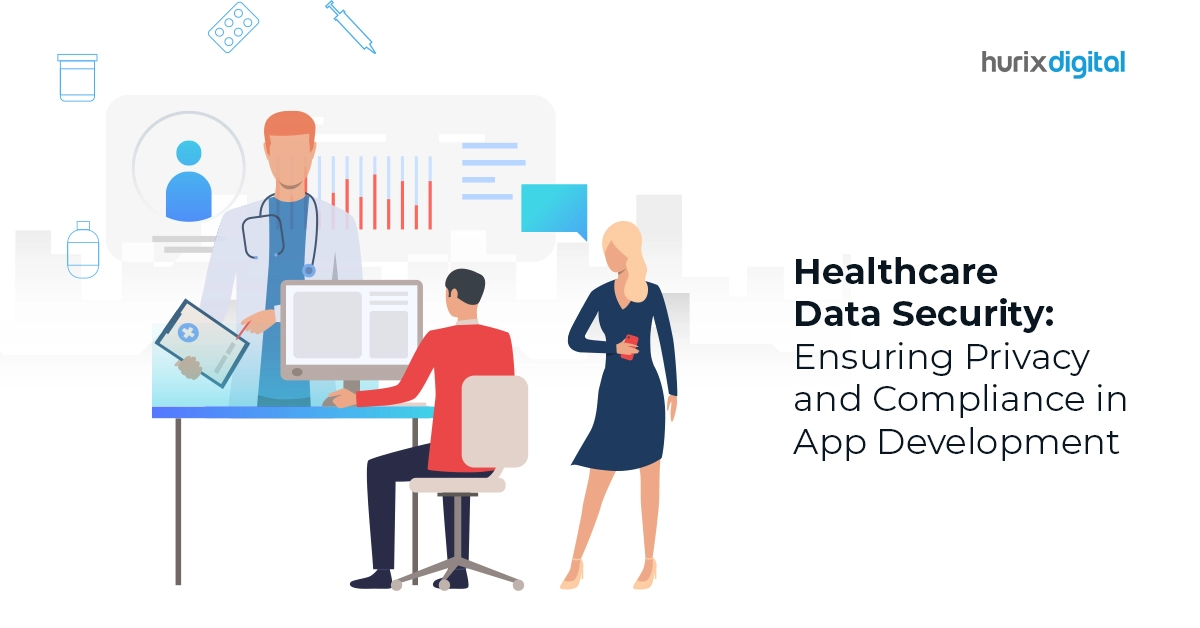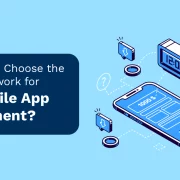
Healthcare Data Security: Ensuring Privacy and Compliance in App Development
Summary
Discover best practices for ensuring data security and compliance in healthcare app development. This article provides insights into protecting sensitive information.
With technology influencing almost every sector, healthcare is no exception. Healthcare apps have become an important tool for patients as well as medical professionals to access and provide efficient medical care.
As per Fortune Business Insights, the mobile health apps market size is projected to grow to a whopping USD 861.40 billion by 2030.
That said, the integration of healthcare and technology requires rigorous security measures due to the sensitive nature of patient data. Ensuring privacy and compliance with regulations such as HIPAA (Health Insurance Portability and Accountability Act) is paramount, especially in healthcare app development.
This blog explores the importance of healthcare data security and strategies for app developers to uphold privacy and compliance standards.
Table of Contents:
- Strategies to Ensure Healthcare Data Security in Healthcare App Development
- Global Regulatory Standards Compliance for Protected Health Information (PHI)
- Establish Robust Authentication and Access Controls
- Ensure Data Encryption in Healthcare App Development
- Conduct Regular Security Audits
- Regular Updates and Security Patches
- Employ Secure APIs in Healthcare App Development
- Secure Cloud Framework
- Staff Training
- User Education and Consent
- Wrapping Up
Strategies to Ensure Healthcare Data Security in Healthcare App Development
Healthcare apps have facilitated access to medical needs with a simple click of a button. Whether it is monitoring pulse, recording blood pressure, or managing prescriptions, everything is convenient and can be accessed on the go, all thanks to healthcare apps.
However, these technological marvels called healthcare apps also bring the critical issue of patient data security to the fore. Protecting sensitive patient health information is an ethical as well as legal obligation.
Here are some strategies that developers must follow in healthcare app development to establish a robust security network for patient healthcare data:
1. Global Regulatory Standards Compliance for Protected Health Information (PHI)
Healthcare app developers need to be well-versed in the global rules governing patient data. Legislation about patient data protection varies by nation and serves to safeguard individuals’ medical records.
Healthcare apps operating in the USA are required to comply with HIPPA, while in Europe patient data is subject to GDPR, or the General Data Protection Regulation. By adhering to international rules and standards, developers may ensure the safety and security of patient medical and personal information.
2. Establish Robust Authentication and Access Controls
The authentication mechanism is the key to maintaining a delicate balance between security and accessibility. Employ strong authentication methods during healthcare app development.
Use biometric authentication or two-factor authentication (2FA) to enhance app security. This will ward off any unauthorized person from getting access to data, and access controls will only be in the hands of legitimate users.
Hiding personal information like birth date, phone number, etc. ensures privacy when data is displayed in the app and prevents the revelation of the patient’s identity.
Also Read: How Data Mining is Revolutionizing the Healthcare Industry
3. Ensure Data Encryption in Healthcare App Development
Data encryption is imperative to improve app security and protect sensitive health data from hackers, both during storage and transmission. When users are confident about the confidentiality of their health information, they will willingly share important health details through the app. This will further help healthcare providers offer the right type of care.
Only authorized parties will be able to decrypt material that has been encrypted following statutory encryption standards. So, even if anyone can lay hands on the information, they will not be able to read the data.
4. Conduct Regular Security Audits
Identify potential vulnerabilities in your app by performing regular risk assessments through security audits. Outsmart hackers by simulating attacks and exposing susceptibilities in the system. This way, you can preempt any hacking of protected health information (PHI).
Additionally, maintain audit trails for future audits to pick out and review those who have accessed the data. This will ensure accountability and indicate any security breaches.
5. Regular Updates and Security Patches
Employ regular software updates and keep your system updated with the latest security patches to avoid any potential threat to data security. As the software becomes outdated, it becomes vulnerable to hackers due to its known vulnerabilities. Updating it ensures security against any type of attack and ransomware.
6. Employ Secure APIs in Healthcare App Development
APIs, or Application Programming Interfaces, are used to communicate with other healthcare systems, such as Electronic Health Records (EHR). To prevent any security breach, the APIs must be secured through bona fide authorization protocols. Using secure processes like tokenization will enable safe data transfer from one end to another.
7. Secure Cloud Framework
When it comes to selecting cloud computing solutions for the apps, providers employing strong security protocols must be chosen. Cloud networks using firewalls, intrusion detection systems, and other access controls shield your stored data from any unsolicited access and enhance your app’s capacity.
8. Staff Training
Constant training and knowledge updates in data security are non-negotiable for your team. Your employees must be familiarized with the challenges and the latest advancements in cybersecurity. The staff should be regularly updated about the different modus operandi the hackers utilize, such as social engineering, phishing, and others.
They should be well versed in working with the app, be able to guide the visitors and identify and report any potential safety incidents to the organization. Update your staff on technological advances and regulatory changes from time to time.
9. User Education and Consent
Most healthcare apps gather users’ data, including their behavioral details, and physical, mental, and other attributes, which are then used by healthcare professionals for evaluation. Though these are essential details, they need users’ consent.
Get users’ consent before asking for these details, and inform them when, where, and with whom this data will be shared. They should be able to revoke this consent as and when they require it.
Furthermore, they should be trained on how to protect their data, apply access controls, use biometrics, manage passwords, and follow other security rules.
Also Read: Healthcare Access for All: Navigating USA’s Digital Accessibility Standards
Wrapping Up
Healthcare apps cater to a unique need as they enable patients and healthcare providers to connect securely. Healthcare app development is a complex task that calls for a deeper understanding of best practices about the privacy and security of protected health information (PHI).
Safeguard your users’ information and avoid any legal issues by developing apps that are compliant with legal frameworks. To build a trustworthy healthcare app, get in touch with Hurix Digital who have huge expertise in building secure healthcare apps. It will not only foster patient trust but will also offer a competitive edge.
Contact us today for more information.

Currently serving as the Vice President of Technology Delivery Operations at HurixDigital, a prominent global provider of digital content and technology solutions for publishers, corporations, and educational institutions. With over 16 years of experience spanning EdTech and various domains, I hold certification as a SCRUM Product Owner (CSPO). My expertise includes operations, finance, and adept people management skills.




